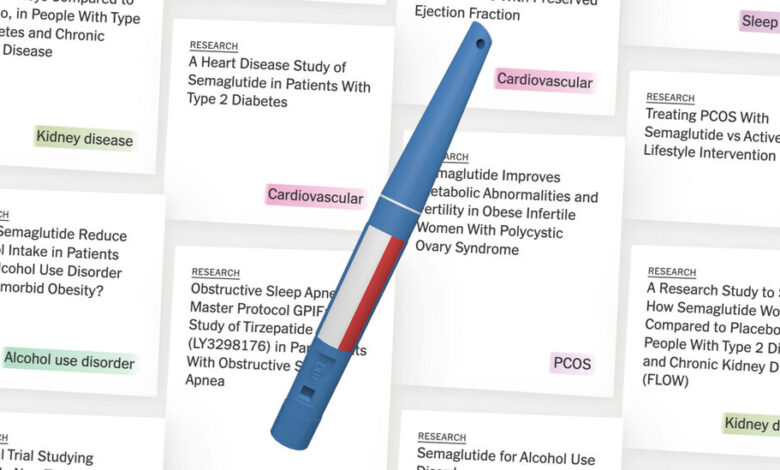Can Ozempic and Weight Loss Drugs Treat Other Diseases?

Ozempic and other drugs like it have proven powerful at regulating blood sugar and driving weight loss. Now, scientists are exploring whether they might be just as transformative in treating a wide range of other conditions, from addiction and liver disease to a common cause of infertility.
“It’s like a snowball that turned into an avalanche,” said Lindsay Allen, a health economist at Northwestern Medicine. As the drugs gain momentum, she said, “they’re leaving behind them this completely reshaped landscape.”
Much of the research on other uses of semaglutide, the compound in Ozempic and Wegovy, and tirzepatide, the substance in Mounjaro and Zepbound, is only in the early stages. One of the biggest questions scientists are seeking to answer: Do the benefits of these drugs just boil down to weight loss? Or do they have other effects, like tamping down inflammation in the body or quieting the brain’s compulsive thoughts, that would make it possible to treat far more illnesses?
We won’t likely know anytime soon. “We’re still learning how these medicines work,” said Dr. Daniel Drucker, one of the first researchers to study these drugs. (Dr. Drucker consults for Novo Nordisk, the company that makes Ozempic and Wegovy.)
People with the conditions below, many of whom have few good options for treatment, could benefit in the long run if these trials are successful. And for weight-loss drugmakers, every new use could catapult the drugs even further into blockbuster status. Some of these applications — including for heart disease and sleep apnea, which each affects tens of millions of people — have become targets for these companies and could prove especially lucrative. These medications are a “gold mine,” Dr. Allen said. “There is no upper bound for where the market is going.”
As evidence emerges from these studies, researchers will get a clearer idea of how, exactly, these drugs work in the body. If they can treat even more diseases, they could shake up medicine all over again.
Alcohol use disorder
The issue
Alcohol use disorder is common — nearly 30 million people in the United States had the condition in 2022 — but it’s rare for people to get diagnosed, and often extraordinarily difficult for them to find treatment. There are effective medications on the market, but some people who could benefit from them aren’t even aware that they exist.
The potential
Anecdotally, some people who take drugs like Ozempic say the medications make them want to drink less, and in some cases, turn them off alcohol altogether. Researchers are trying to untangle why. Because people feel full when they take these medications, they may lose interest in alcohol as well as in food. It’s also possible that because these drugs target parts of the brain that regulate appetite, they could also affect compulsive behaviors that might involve those brain regions, like using alcohol or stimulants, gambling, smoking or even nail-biting.
The early evidence
One small study followed six people with alcohol use disorder who were taking semaglutide for weight loss. All six drank significantly less after they had been on the drug for between one and nine months. In an online survey of 153 adults with obesity, most of whom were white and women, those who took semaglutide or tirzepatide reported drinking significantly less than peers not on the medications.
While data are limited, some patients with alcohol use disorder have already started asking doctors about these drugs. Researchers studying how these medications affect drinking recently responded to that demand with a piece in Nature Medicine, urging doctors not to use the drugs for alcohol use disorder without more research.
Polycystic ovary syndrome
The issue
As many as five million people in the United States have polycystic ovary syndrome, or PCOS. The condition is a leading cause of infertility and causes irregular periods. There are treatments available — diet and exercise changes, birth control pills and the diabetes drug metformin — but they don’t work for everyone.
The potential
Researchers believe that high testosterone levels contribute to PCOS. When people with the condition lose weight, their testosterone levels often decline. Drugs like Ozempic could help regulate hormones in people with PCOS, said Dr. Melanie Cree, who is leading one of the earliest studies to investigate whether semaglutide can resolve PCOS symptoms.
The early evidence
A small study of 27 people with obesity and PCOS who took a low dose of semaglutide found that after six months, most participants had lost weight and had more regular periods, suggesting their PCOS was under better control. Dr. Cree completed a study of semaglutide in adolescent girls with PCOS that showed similar results, and she is recruiting for another focused on period regularity.
Liver disease
The issue
Up to 70 percent of people with Type 2 diabetes and between 50 and 90 percent of people with obesity have nonalcoholic fatty liver disease, or NAFLD, which occurs when excess fat builds up in the liver. The condition can cause liver damage so severe that some patients end up needing liver transplants.
The potential
Doctors typically urge obese or overweight patients with NAFLD to lose weight in order to lower the amount of fat and inflammation in the liver. Because drugs like Ozempic lead people to lose weight, they may also decrease the amount of fat stored in the liver. Type 2 diabetes also increases the risk of NAFLD. By treating it, drugs like Ozempic may also reduce the risk or severity of liver disease.
Scientists have two other theories about how the drugs might help: by improving the insulin resistance common in people with NAFLD and lowering inflammation that can damage the liver.
The early evidence
A Novo Nordisk-funded study found that compared to placebo, semaglutide didn’t significantly improve liver scarring or resolution of nonalcoholic steatohepatitis, or NASH, a severe form of nonalcoholic fatty liver disease. The study included people with cirrhosis, or scarred and permanently damaged livers. A larger Novo Nordisk-funded trial found that patients in earlier stages taking semaglutide were more likely than those on a placebo to see their NASH resolved, but not significantly more likely to see their scarring improve.
Novo Nordisk is now running an even bigger clinical trial on semaglutide and NASH, and the Food and Drug Administration has designated the drug a “breakthrough therapy” for the disease, which will expedite regulatory review. Researchers funded by Eli Lilly are also investigating whether tirzepatide can treat NASH.
Cardiovascular issues
The issue
Heart disease killed nearly 700,000 people in the United States in 2022, making it the country’s leading cause of death. Experts say there’s an urgent need for new therapies that can reduce the risk of heart attacks and strokes and improve symptoms like fatigue and shortness of breath that can make it difficult for people with heart disease to get through the day.
The potential
Obesity significantly raises the risk of cardiovascular disease, which is why some doctors think that losing weight might treat and prevent heart issues. The drugs may also be able to help by lowering inflammation, which may lead plaque to form in the heart and trigger blood clots.
The early evidence
In November, a major trial showed that semaglutide lowered the risk of events like heart attacks and strokes by 20 percent among obese and overweight people with heart disease. Another trial of people with obesity and a certain type of heart failure found that semaglutide could improve symptoms and make it easier to exercise. Eli Lilly is conducting its own trial on tirzepatide and heart failure. And more studies are in the pipeline: Researchers are examining whether semaglutide can reduce plaque in the heart, improve symptoms of heart failure or reduce damage from strokes.
Sleep apnea
The issue
An estimated 30 million people in the United States suffer from obstructive sleep apnea, in which breathing repeatedly stops and starts during sleep. Treatments like the use of continuous positive airway pressure, or CPAP, machines can help, although patients often find them uncomfortable. Many with sleep apnea are undiagnosed. If it isn’t properly treated, the condition can take a significant toll on people’s health and can raise the risk of complications like heart disease and Type 2 diabetes.
The potential
Sleep apnea is more common among people with obesity. That’s due to a complex set of factors, including that deposits of fat in the neck can clog the airway when a person is lying down. Research has shown weight loss, including through bariatric surgery, can help.
The early evidence
There’s very little data so far, though a spokesperson for Eli Lilly said the company expected to complete a study of tirzepatide and sleep apnea in the spring of 2024. Novo Nordisk is not currently studying whether semaglutide can treat sleep apnea.
Kidney disease
The issue
Roughly one in three adults with Type 2 diabetes also has chronic kidney disease, which occurs when the kidneys are damaged and can’t function properly. Patients with the disease may ultimately need dialysis or a kidney transplant, and if it goes untreated, the condition can be fatal.
The potential
Kidney damage happens slowly over time and is irreversible in almost all cases, said Dr. George Bakris, who was involved in a trial of semaglutide in people with Type 2 diabetes and chronic kidney disease that was backed by Novo Nordisk. Drugs like Ozempic may be able to prevent further damage, partly because weight loss reduces the risk of hypertension and Type 2 diabetes, which are risk factors for chronic kidney disease.
It is not totally clear how else these drugs might improve chronic kidney disease, but one potential factor is that they might reduce inflammation, which can be harmfully high in people with the condition.
The early evidence
Novo Nordisk announced in October that it had halted a trial of semaglutide in people with Type 2 diabetes and chronic kidney disease after an early analysis made clear the drug was effective, though the company has not yet released the data. The company is funding another study to examine how semaglutide works in the kidneys. Eli Lilly is funding a trial of tirzepatide in people with obesity and chronic kidney disease.
These and other studies are part of what Dr. Howard Forman, a professor at the Yale School of Medicine who specializes in health policy, calls “an explosion of opportunities.”
Whether those opportunities can become new treatments remains to be seen.
“We are on the very, very early upsweep of this whole industry,” Dr. Forman said, “and nothing will surprise me.”
Source link



